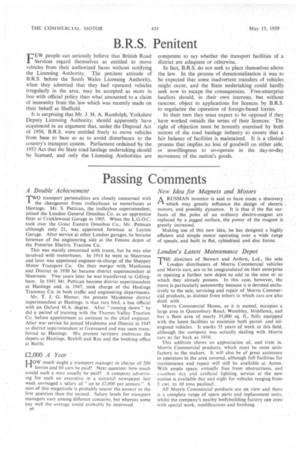B.R.S. Penitent
Page 40

If you've noticed an error in this article please click here to report it so we can fix it.
F"people can seriously believe that British Road Services regard themselves as entitled to move vehicles from their authorized bases without notifying the Licensing Authority. The penitent attitude of B.R.S. before the South Wales Licensing Authority, when they admitted that they had operated vehicles irregularly in the area, may be accepted as more in line with official policy than what amounted to a claim of immunity from the law which was recently made on their behalf at Sheffield.
It is surprising that Mr. J. H. A. Randolph, Yorkshire Deputy Licensing Authority, should apparently have acquiesced in an argument that, under the Disposal Act of 1956, B.R.S. were entitled freely to move vehicles from base to base so as to avoid disturbance to the country's transport system. Parliament ordained by the 1953 Act that the State road haulage undertaking should be licensed, and only the. Licensing Authorities are competent to say whether the transport facilities of a district are adequate or otherwise.
In fact, B.R.S. do not seek to place themselves above the law. In the process of denationalization it was to be expected that some inadvertent transfers of vehicles might occur, and the State undertaking could hardly seek now to escape the consequences. Free-enterprise hauliers should, in their own interests, but without rancour, object to applications for licences by B.R.S. to regularize the operation of foreign-based lorries.
In their turn they must expect to be opposed if they have worked outside the terms of their licences. The right of objection must be honestly exercised by both sectors of the road haulage industry to ensure that a fair balance of facilities is maintained. It is a clinical process that implies no loss of goodwill on either side, or unwillingness to co-operate in the day-to-day movement of the nation's goods.




















































































































